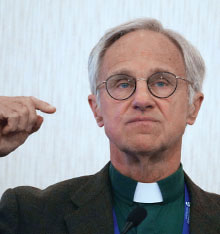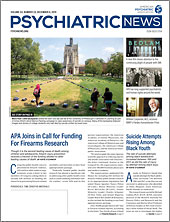Psychiatrists and faith leaders share a common cause in addressing climate change and helping people turn grief, fear, and anxiety into constructive action.
That’s the message that Rev. Jim Antal delivered at this year’s IPS: The Mental Health Services Conference in New York in October. Antal is the special advisor on climate justice to the general minister and president of the United Church of Christ. From 2006 to 2018, he led the organization’s 350 churches in Massachusetts as their conference minister and president. In 2017, Yale Divinity School honored him with the William Sloane Coffin Award for Peace and Justice.
“Our generation is living on the hinge of history,” Antal told attendees. “If civilization is to continue, science tells us that society must immediately make the greatest transitions humanity has ever managed. First and foremost, we must immediately abandon our dependence on the abundant, inexpensive fossil fuel energy that has built the modern world and replace it with renewable, sustainable, zero-carbon energy sources. And we must carry out this transition in a way that rectifies the massive inequity and inequality that our current distribution of assets represents.”
People are resistant to change and frightened or overwhelmed by the scope of the problem, Antal said, and this is where psychiatrists have much to offer. “Helping people identify what would enable them to face these realities is essential” to make the necessary changes to achieve a more sustainable future. He emphasized the need to reframe the crisis around climate change as an opportunity, noting that the technology necessary to transition away from fossil fuels toward more sustainable energy is available now.
Moreover, he said, the global impact of climate change requires a new understanding of grief. “Grief is now a universal blanket covering all of humanity,” he said. “It’s no longer just the individual grief we experience when we lose someone we love. Such grief isolates the individual because it’s hard for the grieving person to imagine anyone else can understand the pain he or she is feeling. But now, as a result of the actions of seven generations of humans, the experience of loss of the Earth we once knew is universal.”
Antal said there are opportunities for alliance between the scientific and faith communities such as the Massachusetts-based Faith Science Alliance for Climate Leadership, which psychiatrists can join or replicate in their local areas. “The purpose of this coalition of scientists and faith leaders is to advocate for public policies in Massachusetts that address the ecological and moral emergency of climate change with bold, swift, and substantive action,” he said. “This alliance seeks to educate the people of Massachusetts on the urgency of the climate crisis and our shared responsibility both to reduce greenhouse gas emissions and to adapt to the changing climate.”
James Fleming, M.D., chair of the APA Caucus on Climate Change and Mental Health and chair of the session, told Psychiatric News that psychiatrists and faith leaders who have become aware of the great risks facing human civilization due to climate disruption can support each other and collaborate to advise the public about the risks and help society cope with the consequences of climate change.
“Climate-related emotions such as anxiety, dread, and grief are being transformed from individual reactions to personal situations to group phenomena in response to climate disasters and grave scientific predictions,” he said. “Psychiatrists can learn, for example, from the growing experience of faith leaders such as Rev. Antal who have started to help their congregations deal with ‘group grief.’ Hope has taken on a new meaning about a new sense of engagement in action that leads to empowerment.”
Fleming is also a member of the steering committee of the Climate Psychiatry Alliance (CPA). According to its website, the CPA is a group of psychiatrists “united by the mission of assuring optimal mental health by preventing and mitigating climate change’s impact on mental health and maximizing the mental and physical health co-benefits of a sustainable, regenerative, global response.” ■
Information about Rev. Antal and his work as a climate change activist is posted
here. Information about the Climate Psychiatry Alliance is posted
here. Information about the Faith Science Alliance for Climate Leadership is posted
here.

